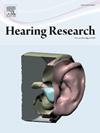Tinnitus, lucid dreaming and awakening. An online survey and theoretical implications.
IF 2.5
2区 医学
Q1 AUDIOLOGY & SPEECH-LANGUAGE PATHOLOGY
引用次数: 0
Abstract
Background
Tinnitus is the perception of phantom sound in the absence of a corresponding external source. Previous studies reported that the presence of tinnitus is notably absent during dreams. This study aimed at replicating previous findings regarding tinnitus-free dreams, while also gaining a deeper understanding of tinnitus manifestations during dreams and after awakening.
Methods
For this observational study, 195 tinnitus patients answered an online survey on the mutual-help community Siopi.
Results
148 subjective tinnitus patients could recall their dreams. Among them, 94.6 % state they do not hear their tinnitus while dreaming. The rest (5.4 %) report higher tinnitus burden, higher stress and more often exhibit cophosis, tinnitus related to peripheral auditory pathology and/or associated with other health comorbidities. 12.2 % of the participants frequently experience lucid dreams. Among them, 38 % could perceive their tinnitus during lucid dreams, and this was strongly associated with the concomitant perception of external sounds during lucid dreaming. While the majority of patients report perceiving their tinnitus instantly upon awakening, during nocturnal awakenings, 17.2 % declared they could be awakened by their tinnitus and 10.0 % mentioned that their tinnitus can temporarily cease.
Conclusions
Our findings confirm the previous findings: tinnitus is rarely perceived during dreams. Remarkably, our study is the first to document the case of tinnitus during lucid dreaming. 64 % of these patients gain higher-order consciousness attributes while still experiencing a tinnitus-free state. Our observations suggest that the presence or absence of gating of external auditory information during dreams acts as a tinnitus on-off switch, refining the previously proposed integrative model of auditory phantom perception.
求助全文
约1分钟内获得全文
求助全文
来源期刊

Hearing Research
医学-耳鼻喉科学
CiteScore
5.30
自引率
14.30%
发文量
163
审稿时长
75 days
期刊介绍:
The aim of the journal is to provide a forum for papers concerned with basic peripheral and central auditory mechanisms. Emphasis is on experimental and clinical studies, but theoretical and methodological papers will also be considered. The journal publishes original research papers, review and mini- review articles, rapid communications, method/protocol and perspective articles.
Papers submitted should deal with auditory anatomy, physiology, psychophysics, imaging, modeling and behavioural studies in animals and humans, as well as hearing aids and cochlear implants. Papers dealing with the vestibular system are also considered for publication. Papers on comparative aspects of hearing and on effects of drugs and environmental contaminants on hearing function will also be considered. Clinical papers will be accepted when they contribute to the understanding of normal and pathological hearing functions.
 求助内容:
求助内容: 应助结果提醒方式:
应助结果提醒方式:


